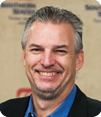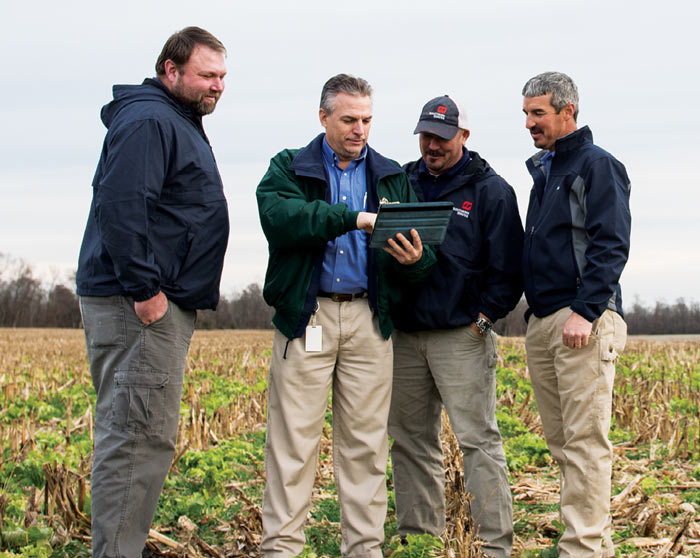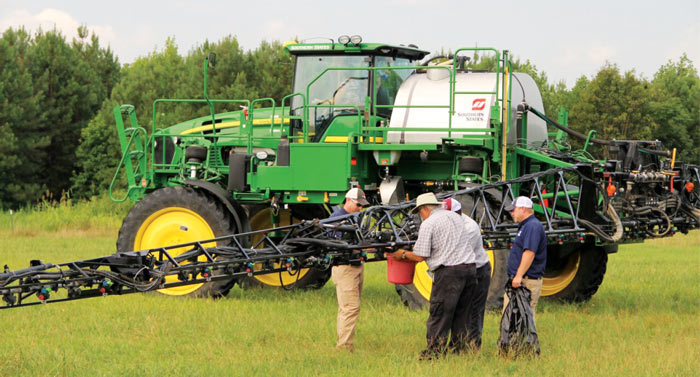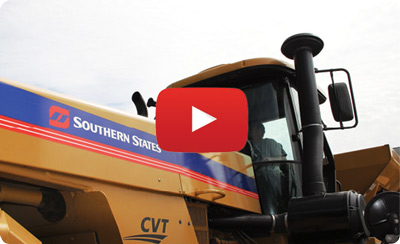Pictured Above: Unlike traditional farm equipment dealerships, 2017 Most Valuable Dealership winner Southern States Cooperative doesn’t sell hardware or machinery. Agronomy services accounted for nearly 50% of the 200,000 member co-op’s $1.6 billion revenue total in 2016. Pictured left to right, Steve Patterson, senior vice president corporate marketing, communications and government affairs, David Swain, precision farming manager and Steve Becraft, executive vice president of agronomy.
Hardware is often cited as the foundation on which many precision farming businesses are built and revenue generated from component sales has traditionally been the pathway to profitability.
But banking on the agronomic origins of precision farming is the cornerstone of Southern States Cooperative’s “decision ag” business model. While modern and innovative, it’s also transparent and practical.
“This industry has collected a lot of pretty pictures for years and precision has been driven by the equipment,” says David Swain, manager of the Richmond, Va.-based co-op’s precision farming division. “Our approach is to deliver agronomy technology by taking that collected data and making it useful to our customers. We don’t sell technology for the sake of technology. We want to build our business by making sure that our agronomic practices enable our customers to better manage their crop production.”
Unlike traditional farm equipment dealerships, Southern States doesn’t sell hardware or machinery, and agronomy services account for nearly 50% of total annual revenue for the 200,000 member co-op. In fiscal year 2016, $679 million of the company’s $1.6 billion in revenue came from it’s agronomy division.
To meet revenue expectations along with the diverse support needs of customers from Delaware to Florida — and states in between — the 2017 Precision Farming Dealer Most Valuable Dealership has cultivated a precision culture rooted in training diversity, service flexibility and a proof vs. projection sales mentality.
Southern States Cooperative
Founded: 1923
Employees: 3,500. The dealership has 37 employees directly involved with precision farming.
Precision Lines: The co-op does not sell precision equipment, but works directly with John Deere, Case IH, AGCO, MapShots, Trimble, Raven, Climate Corp., Winfield, Veris and GK Technologies
Locations: 43
3 Year Precision
Revenue Breakdown (Fiscal Year):
2014: $2,066,901
2015: $2,676,102
2016: $2,536,351
3 Year Agronomy
Revenue Breakdown (Fiscal Year):
2014: $800,000,000
2015: $765,100,000
2016: $679,600,000
3 Year Active Precision
Service Acres (Fiscal Year):
2014: 550,000
2015: 615,000
2016: 765,000
‘As Precise as Precision Gets’
All of Southern States’ precision farming revenue is serviced-based, which means offering the right scope and depth of support is the key to profitability, Swain says. Billable services the co-op delivers include site specific soil sampling, yield map processing, variable-rate seeding and fertilizer application and aerial scouting.
The company grew precision service revenue from about $2 million in 2014 to $2.6 million the following year, and saw only a minor dip in 2016 to $2.5 million, despite a downturn in the ag economy.
On it’s primary brochure promoting 14 different precision services, the co-op uses the tagline “As Precise as Precision Gets,” which is designed to convey the message to customers that the company is a comprehensive source for “retail agronomy.”
“We’re focused on limiting factors to crop production,” Swain says. “So we’re looking at the operation as a whole, not just one perspective of it. We’ve moved away from a conventional crop production programs and moved more toward a nurturing-focused program.”
Using the 4Rs of nutrient stewardship — right source, right rate, right time and right place — as a framework, precision services are tailored to individual customer needs, rather than packaged in a one-size-fits-all program.
“It’s really tough to bundle services the same because our customers in Virginia are going to do things differently than the ones in North Carolina, even though they are relatively close in geography,” Swain says. “For that reason, we’ve had services that started as loss leaders in some areas where precision was used as an indirect driver of revenue for another part of the company.”
Swain cites tissue sampling as an example. Though not a new service, it’s been an effective entry point for selling precision novices on the value of technology, while also helping close the deal on fertilizer purchases.
Dealer Takeaways
Offering à la carte precision services within a tiered program provides more choice for customers and increased sales flexibility for dealers.
Integrated training across departments can create job promotion incentives and provide oversight of agronomic advice.
Developing a deep bench of skilled employees will fulfill customer expectations with equipment performance and service quality.
“We’ve done tissue sampling for years, but the way we’ve sold it has changed,” he says. “It’s gone from something we gave away to help sell nutrients or fungicide to being a chargeable service with proven return on investment for the customer. The biggest impact is with our input business, because we can show customers what a sample means and how to fix a trouble spot in their field.”
Rather than walking into a farmer’s field and speculating that there is a manganese deficiency, which can arouse suspicion from the customer that the co-op is simply trying to sell more fertilizer, Swain says salespeople can now support a recommendation with analytical evidence.
Having the ability to pinpoint a problem area and back it up with data adds credibility to the recommendation and builds confidence with the customers.
“They know the recommendation is rooted in science, not opinion and based on what’s happening in the field,” Swain says. “It’s making decisions on fact, not predictions.”

"Farmers want a deep bench. They don’t expect one person to know it all, especially when it comes to the precision side..."
—David Swain
Discover, Evaluate, Analyze
To further brand its precision and agronomic services — and build up customers’ technology stamina — without overwhelming them, Southern States developed and launched a 3-tiered program in 2016.
The structure is designed to graduate customers from one tier to the next over time, while still offering flexibility within each to tailor the most beneficial services for individual operations, according to Chris Conway, precision ag coordinator for eastern Virginia.
“One of the motivations for developing the tiered programs is that we were having a lot of success selling grid sampling by soil type, but within those grids there might be three different soil types,” Conway says. “That left a lot of questions about variability and we realized we can’t treat every farm the same way. We wanted to make it easier for them and us, so we can now sample in 2.5 acre grids and do more in-depth testing to get a more accurate picture.”
The introductory program, called “Discovery” is $3.95 per acre and provides pre-season, in-season and postseason evaluations, along with one satellite image of a field to determine soil sample zones or evaluate crop health. The beginner tier also includes 3 zone soil samples per 50 acres, 1 field site verification, 1 tissue sample and yield data processing.
The second tier is “Evaluation” and the most popular option since the program formally launched in May 2016, according to Conway. At $14.95 per acre, this level includes all of the Discovery services, along with soil sampling (zone or grid), additional in-field visits and a season review of the customer’s operation.
“This is the comfort zone for a lot of our customers today,” Conway says. “It’s a longer-term, more refined approach that establishes a baseline for crop management programs and systematically monitors and evaluates crop progress throughout the growing season.”
The 2-3 year package starts with 2.5 acre soil samples the first year and adds in-season satellite imagery to the Discovery program services. The second and third years rely on production sampling that includes soil sampling, in-season tissue sampling and visual evaluation of three specific points within 50 acre zones to spot-check and evaluate nutrient levels and ensure fertility recommendations are accomplishing the desired goals.

While Southern States has 37 staff members directly involved in the precision farming part of the company, technology touches nearly every aspect of the co-op’s business — from application services to input and crop protection product sales. “One of things we’ve learned is that farmers want a deep bench,” says David Swain, precision farming manager. “They don’t expect one person to know it all, especially when it comes to the precision side.”
The final tier is “Analysis” — the most comprehensive package at $19.95 per acre. Focusing on an entire farm management strategy, the top-level program adds a postseason evaluation that includes performance outlined by seed variety, crop protection treatments and soil type. As-applied data is also processed, providing customers with a digitized record keeping of any and all applications of seed, nutrients and crop protection products.
What the Judges
Say About Southern States Cooperative…
“They have a very detailed and structured internal training program, which centers on certifications and accountability…”
“Data analysis and emphasizing the agronomic side of precision is a major part of what they do and do well. That’s impressive…”
“That commitment to providing a complete solution comes through in the scope of services they offer…”
“It’s all about service to separate from the pack in precision. Southern States appears to be doing that on a daily basis…”
Conway says only a handful of farmers initially enrolled in the “Analysis” level, but the overall program has contributed to dramatic growth in the volume of Southern States’ active precision service acres. The last 4 years have seen service acres nearly double, from 550,000 in 2014 to the current total of 900,000.
One of the services that contributing to the increase is compaction testing. While the service is part of the Analysis level, it may be added to other tiers given that compaction is a problem more area farmers are seeking to fix.
Kevin Powell, territory sales manager based in Orange, Va., worked with a customer who had compaction tests taken at 6, 12 and 18 inch depths. While the 6 inch reading revealed no compaction, deeper testing showed a problem that prompted the customer to alter his tillage practices.
“It showed that his strategy was working to a certain point, but we helped show him the next step,” Powell says. “One of the advantages to our service structure is that it’s set up as almost an à la carte program. We have an outline for what we can provide and we charge on a per-acre basis, rather than hourly because in reality, we run over every acre. But if we sample 50 acres and find that only 10 need a fertilizer application, that portion is what we’ll charge for if it can be mapped out and done properly.”
This transparency and collaborative relationship with customers breeds trust through an accumulation of data that can be analyzed year after year to chart progress or areas that need improvement. At the same time, Powell adds that it’s up to the salespeople, agronomists and precision coordinators to make sure they are validating customers’ investment to retain their business.
“I’ve always liked numbers and taking a field, dividing it up and crunching the numbers to drill down to cost of production,” he says. “That’s not the case for many of our customers, so it’s our job to prove ourselves and the services we provide are generating revenue for them. Retention is what we want.”

Southern States developed an in-house training program called GrowMaster, which allows employees to be certified professionals in agronomy, application technology and technical support. Starting out, applicators are expected to be secondary salespeople because in many cases, they are the most recognizable employee on a customer’s farm and can make or break a sale.” Photo Courtesy of SOUTHERN STATES
‘A Deep Bench’
While Southern States technically has 37 staff members directly involved in the precision farming part of the company, Swain notes that technology touches nearly every aspect of the co-op’s business — from application services to input and crop protection product sales.
The company has more than 100 certified crop advisors who provide fertilizer prescriptions, executed by certified applicators behind the wheel of a fleet of several hundred sprayers and spreaders.
“Precision farming has always been kind of a misnomer because for us, it’s just farming,” Swain says. “On the production and revenue side, we’ve done a good job of growing and if nothing else, having our team structured the way it is makes us more cognizant of revenue streams.”
The company has precision ag coordinators who work in their respective districts and report to a general manager. Coordinators’ responsibilities are diverse and broad to include training their district personnel and customers, managing the mapping for variable-rate application and soil sampling program for their district, assisting in the sales and marketing of the precision farming program for the district and assisting in the telemetry, wireless data transfer and scouting programs.
But Swain points out that while coordinators are the frontline supporters of the precision farming business, they have backup.

"There is risk in what we’re applying on a customer’s field and we need to validate that the prescription is going to work..."
—Weston Waters
“One of things we’ve learned is that farmers want a deep bench,” he says. “They don’t expect one person to know it all, especially when it comes to the precision side.
“It starts with our salespeople who don’t have to be experts, but they have a base knowledge and have to be conversational. What is the customer looking for? How will it fit into their operation? Then the salesperson works with our precision coordinator on implementation. That’s the key. Then it flows up through the business, having the equipment ready to roll, the technology calibrated and so forth.”
Still, Swain acknowledges that he and his staff have to know their limitations as well. This realization helps the company maintain a cooperative relationship with local farm equipment dealerships and keeps customers’ best interests top of mind.
While Southern States has a core of equipment and precision brands it works with, they routinely encounter a rainbow of machinery and an array of technology. Having an outside resource to help troubleshoot problems is an asset.
“Having a good relationship with our local equipment dealers is important, because that’s not our business and not our area of expertise,” Swain says. “We rely on them and they work with us as well. We become unpaid salespeople for each other because we each have an opportunity to provide a service that needs to be done.
“If we’re helping a local dealer with yield monitor calibrations during busy season, that service can help them sell the next combine. For us, it’s about selling the next input or service.”
Sponsored by

Check Our the
2017 MVD Video Series!
Click here to watch exclusive interviews with members of Southern States Cooperative’s precision team. Filmed at the dealership’s location in King William, Va., and its corporate headquarters in Richmond, Va., by Precision Farming Dealer, these videos capture the innovative strategies and proven practices utilized by the 2017 Most Valuable Dealership and are being sponsored by MapShots.
Topics Include:
- Selling Service, One Customer at a Time
- Utilizing Data Management Tools to Deliver Agronomic Solutions
- Developing Depth & Versatility with Precision Staff
- Collaborative Training to Drive Sales Opportunities
- Streamlining Fleet Management with Telematics
Masters of Growth
In lieu of regular supplier training, Southern States developed and implemented its own internal training program called GrowMaster, which allows employees to be certified professionals in agronomy, application technology and technical support.
In addition to being certified crop advisors (CCAs) or Certified Professional Agronomists (CPAs) graduates of the agronomic services program are qualified to recommend all crop inputs, identify crop diseases, insects, weed and plant growth problems. They’re also equipped to interpret soil and nutrient analysis, prepare state-approved nutrient management plans and assist with recordkeeping and profit analysis plus fertilizer, seed and chemical purchase history.
The program also includes site-specific input application training with GPS, electronic record keeping and profit analysis at the store level and annual “Truck Rodeos,” which are coordinated initiatives that ensure equipment is properly calibrated and applicators are trained on the latest spraying technology.
GrowMaster certified equipment technicians must pass a 52 point mechanical performance check, pass an application pattern test certified by the National Assn. of Ag Engineers and be tested on an annual basis.
“The goal is to tie different parts of the business together through the training program,” says Weston Waters, precision ag coordinator for eastern North Carolina. “We work with our applicators in field, but we’re also inspecting equipment and most of that is done on-site at our fertilizer facilities. On the agronomy side, a lot of our agronomists go to the field with our salespeople, so having them collaborate and share information with each other adds another layer of confidence for our customers.”
These coordinated efforts also help safeguard against liability and maintain the reputation of the company’s agronomic services. Waters notes that many of the applicators being hired today, are young and inexperienced, so rather than take for granted that they have a farming background, it’s wise to provide structured training from the start.
“There is risk to what we’re applying in a customer’s field and we need to validate the prescription behind that application is going to work,” he says. “I spend a lot of time in the field, walking behind the machines, making sure the data comes out as it should and the machines are setup properly. It’s easy for a new applicator or employee to get bogged down in the day-to-day, but we need to make sure they understand that our goal is 100% accuracy.”
Another incentive attached to the well-rounded training program is growth potential. In many cases, employees who started as applicators advanced into sales positions and even into management, Waters says.
But even starting out, applicators are expected to be secondary salespeople. In many cases, they are the most recognizable Southern States employee on a customer’s farm, Waters says.
“Generally, the best salesperson on the farm is the man in that machine because they are the most likely to see a customer on a daily basis,” he says. “So the way they present themselves, the professionalism they bring is pivotal in making a sale or breaking one.”
Executing a 4R Strategy with Data Driven Tools
A key component of Southern States’ agronomic success is being able to deliver informed, accurate prescriptions based on the collection of quality data.
The company uses AgStudio software from MapShots to import geo-referenced data, such as soil sample data, Veris samples, as-applied data and as-planted data, to analyze and determine limiting factors in crop production.
The software is also used to determine the best action plan for the season, for customers and then to export application recommendations. Once processed, the program allows for the creation and management of variable-rate irrigation, variable-rate seeding, multi-layer overlays and designing complex management zones.
“We are also able to capture as-applied data in this system and retain that information should the customer question where — and at what rate — fertilizer has been applied,” says David Swain, precision farming manager for Southern States. “The tool promotes our 4R philosophy of right source, right rate, right time and right place and gives us the opportunity to bring in a lot of different layers of data and is very flexible in how we can manage that data and create our recommendations that generate an actionable result.”
The co-op is also using satellite imagery as a way to create zones using historical field images. These zones were created using a GK Technologies Inc. software package.
More recently, Southern States formed a partnership with Winfield and use of its R7 field analytics tool and they are also working with the company’s Answer Plots to gather more local data and better tailor prescriptions to specific soil types and conditions.
“We are building analytics tools that will use Mid Atlantic and Southeast agronomic data to better identify conditions and management practices within our market instead of basing all of our practices from the more prominent Midwest practices,” Swain says. “We plan to use our data analytics to better our agronomics and our decision making capabilities with our customers.”








